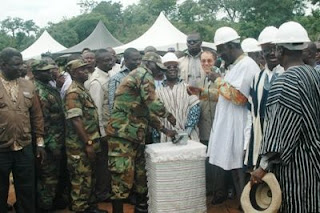 Starlets progress to round 16 in style Ulsan (SK), Aug. 26, GNA - The National U-17 soccer team, the Black Starlets on Sunday made Ghana proud in Ulsan, South Korea when they played a determined game to defeat "threatening" Colombia to qualify to the next stage of the World U- 17 competition.
Starlets progress to round 16 in style Ulsan (SK), Aug. 26, GNA - The National U-17 soccer team, the Black Starlets on Sunday made Ghana proud in Ulsan, South Korea when they played a determined game to defeat "threatening" Colombia to qualify to the next stage of the World U- 17 competition. Before the game, the Ghanaians were relying on the performance of some weak teams who would place in third positions to qualify into the round of 16 on superior goal aggregate if they failed to beat Columbia. Head coach Sellas Tetteh and his boys had promised Ghanaians of a win, which indeed came their way but their next hurdle is how to beat their next opponents, Brazil to sail through to the quarter-finals. The Starlets came into the match with a lot of determination and were favourites to all the connoseurs in Ulsan including the Korean media who later told the GNA Sports that Ghana could easily eliminate Brazil in their next game.
From the referee's whistle, the Starlets dominated play with accurate man - to - man passes and delicate ball control characteristic of Ghanaian players but failed to translate their numerous chances into more goals.
Sadick Adams and Abeiku Quansah entertained the crowd with their moves as they surged towards the Colombian goal but their opponents did well to defend solidly to prevent any early goals.
On the 16th minute mark, Ishmael Yartey had a glorious opportunity to open scoring but the Colombian keeper Mauricio Acosta was alert to save his side by making a good save.
The Starlets continued to mount pressure and in the 32nd minute, Ransford Osei opened scoring after Quansah had meandered his way through the Colombian defense to cross the ball, which found the hungry and waiting foot of Abeiku who made no mistake to slot in the ball for the opener.
They continued to mount the pressure and earned five corner kicks in the half but they failed to utilise any of them.
The Colombians tried to match the Starlets with their physique and height but they could not redeem the goal for referee Craig Thomas of Scotland to bring the proceedings of the first half to an end after one minute of time added on.
The Colombians came back from the recess with full of fight and seem to out-class the Ghanaians initially but Ransford Osei caused a stir in their camp when he nearly increased the tally with just one minute into the second half.
The Colombians pulled a surprise on Ghana when Carlos Rarmos was able to beat the Starlets defense and cross the ball into the 18 yard box, which Christian Nazarith made no mistake to equalise in the 60th minute.
The equalizer gingered the Colombians to make scary moves towards Ghana's goal area but their efforts were always contained by the Ghanaian defense.
The Starlets took control of the match from the 70th minute and used their experience and beautiful game play to get the winning goal in the 84th minute when Ishmael Yartey made no mistake to slot in the ball to create merry making among the Ghanaian fans.
Even though the Starlets had so many scoring chances, they failed to make use of them to increase the tally until the referee brought the proceedings to an end after three minutes of added on time amidst cheers from the Korean fan and the handful of Ghanaians.
Ghana finished second in Group 'F' and would be meeting Brazil who also placed second in Group 'B' on Wednesday, August 29.
Source:Caesar Abagali


















